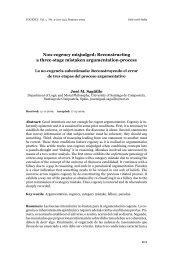Cogency v2 n2
Cogency v2 n2
Cogency v2 n2
You also want an ePaper? Increase the reach of your titles
YUMPU automatically turns print PDFs into web optimized ePapers that Google loves.
David Hitchcock and Bart Verheij (eds.), Arguing on the Toulmin... / J. RITOLA<br />
be able to defend the claims we make. This implies a very strong form of<br />
internalism. Whichever position one ends up taking, one cannot at the same<br />
time hold that we need justification for our inferences and that it is just ‘desirable’.<br />
Regardless, her final position in the conclusion seems reasonable:<br />
In any case, if we agree that the value of an argument is a function of the<br />
value of its reason and warrant, it seems difficult to find room for relativism:<br />
our assignments of truth-values to the corresponding propositions<br />
can only be justified by further arguments. Indeed, whatever the field, it<br />
is both our duty and our inclination as rational beings to do so. (p. 84)<br />
However, this seems to invite the infinite regress of justification: since<br />
any assignment of truth-values must be justified by a further argument, the<br />
assignment of truth-values to this further argument also needs to be justified<br />
by yet another argument, and so on. 3 But more importantly, the mere<br />
fact that one justifies an assignment with an argument does not rule out<br />
relativism. A relativist can accept that there is justification, but hold that<br />
justification differs radically from what we standardly mean by it. It, for<br />
example, pertains only to a certain field. Bermejo-Luque seems to bypass<br />
the accusation of relativism, rather than answer it.<br />
Freeman’s article presents a systematic division of Toulmin warrants<br />
into four classes: a priori, empirical, institutional, and evaluative. Freeman<br />
takes warrants to be generalizations of the argument’s associated conditional.<br />
The division is based on the way the warrants can be intuited, i.e.<br />
how we can ascertain their reliability. As Freeman (p. 98) notes, this seems<br />
to capture the insight of Toulmin’s field-dependency without the difficult<br />
notion of field (or logical type, for that matter).<br />
Warrants<br />
The issue of Toulmin’s perceived relativism cannot be fully treated without<br />
discussing warrants, and many of the articles in this title turn on their na-<br />
3<br />
Such a position is possible; Peter Klein (e.g. 1998, 1999) proposes it under the name of<br />
infinitism.<br />
161








